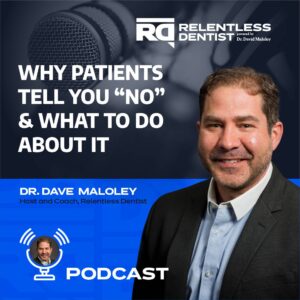Podcast: Play in new window | Download
 As dental practice owners, we understand that people don’t always verbalize any worries they may have regarding their treatments. But ignoring these objections can result in adverse effects for both the patient and the practice. It is therefore essential to put in place tactics to tackle patient objections before they emerge.
As dental practice owners, we understand that people don’t always verbalize any worries they may have regarding their treatments. But ignoring these objections can result in adverse effects for both the patient and the practice. It is therefore essential to put in place tactics to tackle patient objections before they emerge.
Not only will this raise your acceptance rate of cases, but it will also assist in strengthening trust with your patients and illustrate your dedication to their overall health.
In this episode, we will examine some of the most efficient methods for confronting patient objections and examine how you can become a more understanding and transparent dental practitioner.
Hey Doc, how good is your team at generating high-trust case acceptance?
- If you want to make case acceptance easy….
- If you want to avoid feeling pushy or manipulative…
- If you want to have patients say yes to the care you present so that you can focus on your clinical skills…
Tune in now!
Listen in and find solutions to common practice issues at Prescriptions for Your Practice.
Join The Leading Dentist Collective – the free collaborative community for single-location dental practice owners who want to unleash their people, profits, and purpose.
Check out our New Case Study, “Discover How To Recession-Proof Your Dental Practice In The Next 60 Days So That You Increase Profits & Avoid Losing Key Team Members” now at: http://thenorecessiondentist.com/casestudy.
Key Quotes:
- “Make sure that you let them [patients] know the cost of waiting, which will always outweigh the cost of doing it now.”
- “What goes in here mostly is empathy. If they know that you are kind, if they know that you care, if they know that the team is built around this empathetic state, if you give them some semblance of control, then that will put them at ease.”
- “If you don’t address the time commitment, then once the treatment plan comes in and the money part comes in and they realize it’s gonna take five appointments or whatever it is, in a more complex case that may break it.”
- “We don’t want to overstate the situation, but I think sometimes we trivialize it and then we wonder why the patient doesn’t move forward with treatment.”
- “In a low-trust world, if you can kind of read their mind and have the conversation before they bring it up before they object, I think your patient experience, your positive word of mouth, your referrals, and your case acceptance will all keep trending upward in a difficult economic time.”
- “We’re not chasing dollars here, we’re just doing what’s right and we’re being masterful in our communication, coming from a place of care and compassion, but also assertiveness.”
Featured on the Show:
- Podcast: What’s Behind Elite Dentist Performance?, Dr. Dave Maloley
- I appreciate your feedback. Let me know what you learned and loved here: [email protected].






